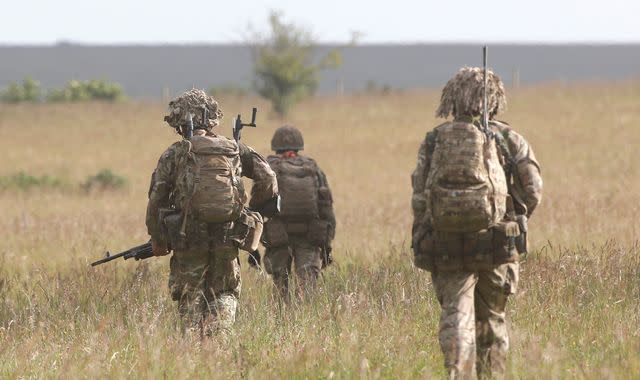Head of armed forces plays down conscription fears and says UK 'not on the cusp of war'

The head of the UK armed forces appeared to take a swipe at his army chief as he insisted "Britain is secure", said "we are not on the cusp of war with Russia," and stressed no one is talking about conscription.
Admiral Sir Tony Radakin used a public speech on Tuesday to stress that the "obligation" of the heads of the army, Royal Navy and Royal Air Force "is to focus on delivering the most from the armed forces today", which might mean having "sensitive conversations", though these discussions are "best done in private".
The comments came a month after General Sir Patrick Sanders made headlines in a separate speech - that journalists had, by contrast, not been allowed to attend or broadcast - when he spoke about the need to train citizens to fight to be ready for a future war.
He said as "the pre-war generation" it was important to prepare - "and that is a whole-of-nation undertaking".
Sounding a very different note, Admiral Radakin said he wanted "to reassure those who may have been alarmed by some of the recent commentary, that Britain is secure".
The admiral said he wanted to address "more sensationalist headlines" - even though many recent headlines have been made by comments by other NATO commanders and by NATO defence ministers about the looming threat posed by Russia.
"We are not on the cusp of war with Russia. We are not about to be invaded," Admiral Radakin told a defence conference at the Chatham House thinktank in London.
Read more: Is conscription coming back? What a future UK 'citizen army' could involve
The Chief of the Defence Staff (CDS) also said he wanted "just to be plain about the responsibility of the chiefs and to reflect on how government works".
He said: "My obligation as CDS, and the obligation of all the chiefs, is to focus on delivering the most from the armed forces today.
"We can always do better and we advise ministers on what more might need to be done in the future. But it is for politicians to decide how much resource is allocated and where and how this is balanced with wider demands of government. Those are sensitive conversations. They are best done in private."
Click to subscribe to the Sky News Daily wherever you get your podcasts
He did not mention General Sanders by name, but the army chief, in his January speech, said the UK needed to be able to field a credible army of 120,000, comprising full-time soldiers and reserves, but admitted "this is not enough".
He then drew on the actions of NATO allies in eastern and northern Europe - "who feel the proximity of the Russian threat more acutely" - and described how they "are already acting prudently, laying the foundations for national mobilisation".
General Sanders said that "taking preparatory steps to enable placing our societies on a war footing when needed are now not merely desirable, but essential".
He was referring to voluntary military training, rather than conscription.
Read more:
UK and NATO urged to consider conscription as Ukraine war enters third year
Wake up to Russian threat, Estonia's weekend warriors tell UK
Russia would lose NATO war 'quickly'
Asked about General Sanders's remarks about the need to prepare for a future war, Admiral Radakin said he was "cautious" about the way his top general's words had been interpreted and said there were no plans for a specific programme to prepare for a future war.
"No one in the Ministry of Defence is talking about conscription in any traditional sense of the term," Admiral Radakin said. "Britain is safe."
Yet Grant Shapps, the defence secretary, has also said the UK and its allies are in a "pre-war world".
The head of the military said that membership of the NATO alliance underpinned UK security and that the allies would defeat Russia in any war.
"The inescapable fact is that any Russian assault or incursion against NATO would prompt an overwhelming response," Admiral Radakin said.
"The biggest reason that [Vladimir] Putin doesn't want a conflict with NATO is because Russia will lose. And lose quickly."
Admiral Radakin also played down the likelihood of any such confrontation in the coming years.
"To pose a realistic threat to NATO's eastern flank within the next 2-5 years, Russia will need to reconstitute her tanks and armoured vehicles, rebuild her stocks of long-range missiles and artillery munitions and extract itself from a protracted and difficult war in Ukraine," he said.


